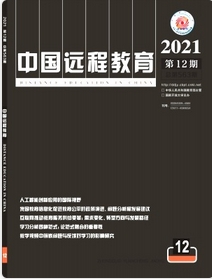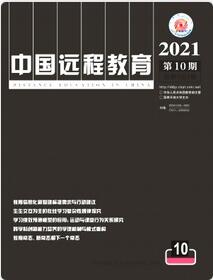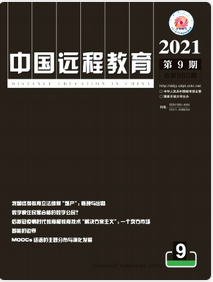Issues in 2021

Contents
• Innovation of NSF AI Research Institutes in AI application: forward-looking visions and affordances for education
• Promoting equity in education through education informatization: policies, issues and recommendations
• Internet-driven reform of educational services supply: change in demand, type of transformation and development pathways
• New developments in America’s competency-based education and lessons for China’s open and distance education
• Four paradigms in learning analytics: why paradigm convergence matters
• The general public’s perceptions of K-12 online instruction during the COVID-19 pandemic
• Effects of in-video questions and answers on learning performance
• A complete table of contents (Issues 1 - 12, 2021)
• Abstracts
Contents
• Teacher professional development in the intelligent age: challenges and pathways
• The postdigital turn: philosophy, education, research
• Online higher education governance in the new era: structure and key systems
• Online higher education quality assurance analysis framework and motivation mechanism
• Why share knowledge? A systematic review of factors influencing knowledge sharing in virtual learning communities
• Towards a peer mentoring model in online and distance education
• Towards an integrated management system for university data governance: its constitution and implementation pathways
• Promoting graduate degree programmes via distance education: lessons from four American distance education universities
• Abstracts

Contents
• Building new infrastructure for educational informatization: standards and implementation
• Exploring complexity patterns of online learning featuring student-student interaction
• Using learning performance prediction model to predict the relationship between physical exercise and classroom behavior
• Cultivating interdisciplinary creativity: theoretical mechanism and model reconstruction
• A study on learning efficiency of MOOC completers and cohort differences
• Education in normal, new normal, and next normal
• Innovations in seamless learning research and practice from the perspective of learning sciences: an interview with Professor Chee-Kit Looi
• Factors affecting online learning viscosity from the perspective of Illeris’s (2007) theory
• Abstracts

Contents
• Why does China have no Lifelong Education Act ?
• From digital native to digital citizen: enhancing digital citizenship
• Post-Covid-19 education and education technology ‘solutionism’ : a seller’s market
• A study on the influence of blended synchronous learning environments on students’ cognitive engagement
• Designing smart learning space for open universities
• Boundaries of intelligence: research on learner autonomy in intelligent tutoring systems
• Theme distribution and dynamic changes in MOOC discourse between 2012-2019: using Sina Weibo as a case
• Foreign language competence: IT-supported accurate diagnosis and teaching
• Abstracts
Contents
- Towards a lifelong learning system for all from the perspective of self-directed learning: basic
strategies and nature - Modern distance education policy: development contexts and problems
- An analysis of public awareness of and attitude to online higher education
- Towards an online training model of instructional design for STEM teachers
- Towards a model of online teaching competencies: a practical knowledge perspective
- Partner recommendation based on negotiation: the social development direction of adaptive learning
- Moving the Hackathon online: reimagining pedagogy for the Digital Age
- Book review: Addressing the Learning Needs of Out-of-School Children and Youths through the
Expansion of Open Schooling - Abstracts
Contents
- Designing an organization and description framework for ubiquitous learning resources: a study of
international standards for Learning Cell - Towards innovation in data-empowered education governance: connotation, mechanism and practice
- Creating an intelligent ecosystem of higher vocational education: connotation, structure and pathways
- Research on online learning environments in the past two decades: a review using linear
discriminant analysis and dynamic topic model - Using social media big data in education: value, pathways and challenges
- Irrelevant, overlooked, or lost? Trends in 20 years of uncited and low-cited K-12 online
learning articles - Teachers’role and action orientation in AI in education
- A study of learner engagement patterns on online learning platforms
- Abstracts
Contents
- Research in education science in the intelligent age: connotation, logical framework and pathways
- Online education in Chinese higher education institutions: reform and innovation in the 21st century
- Online education in Chinese higher education institutions: historical context and characteristics of
different periods - How will AI shape the future of schooling and learning? A qualitative meta-analysis of literature
- Context-aware mobile experience sampling methods and tools
- The evolving landscape of micro-credentials: a global insights paper
- Designing blended learning activities for the Internet Plus age
- Towards a system of evaluation indicators: how well does continuing higher education
programs adapt to the changing society? - Abstracts
Contents
- Cultivating talents for rural China since 1949: an analysis of the Communist Labor University
model and the Radio & Television University“One College Student for One Village”model - From equity of opportunity to equity of development: a comparative analysis of large-scale online
education between urban and rural K-12 schools in China during COVID-19 - Artificial intelligence education in K-12 schools in the intelligent era: strategic positioning and
core content domains - A study of data governance concerning education public service in smart cities
- A study of cMOOC learners’connectivity level and relationship between connectivity types
- Transformation of internationalization in higher education: from classrooms to virtual settings
- Learner-platform interaction behavior mining and learning prediction model building
- A review of the global MOOC movement in 2019
- Abstracts
Contents
- Key issues concerning the development of intelligent education
- Towards a prediction model of learning performance: informed by learning behavior big data analytics
- Towards education digitalization for modernization: policy implications from Chinese Education
Modernization 2035 - Educational data availability on Chinese local government platforms: status quo, problems and
solutions - The evolution of portfolio in higher education: past, present and future
- Effects of virtual reality on learning outcomes in collaborative learning: a meta-analysis of empirical
studies retrieved from major English databases - An empirical study on lifelong learning for the disabled
- Abstracts
Contents
- Information technology in educational assessment: empowerment, challenges and solutions
- Towards an occupational skills framework for online learning facilitator
- Technology enhanced learning: getting the technology mix right
- Who can succeed in online learning:a study of K12 students’online self-regulated learning
ability and its impact - From media to subject: essence of teaching interaction
- How does technology shape schooling: from the perspective of Pierre Bourdieu’s sociology of practice
- IT-enhanced learning for the Third Age: how does it evolve to cater for changing needs?
- How do senior Hong Kong citizens integrate into the digital world: an active aging perspective
- Abstracts